Kaare E. Janson: Bulgaria's Biggest Mistake is non-Utilisation of the EU Funds
Adelina Marini, January 30, 2012
The fiscal compact should convince the financial markets that Europe can and wants to put its house in order, Danish Ambassador in Bulgaria H.E. Kaare E. Janson is convinced, who spent some time for an interview with euinside. As of January 1 Denmark took over the presidency of the Council of the European Union in a very difficult time for the Union - a downgrade of the credit rating of considered until recently untouchable eurozone countries, gloomy economic perspectives and difficult negotiations on a new treaty between the EU member states, aimed at greater 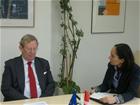 coordination of fiscal and economic policies, more fiscal discipline and in the end of the day - keeping the unity of the Union in general and the eurozone in particular. We are talking with Mr Janson in a spacious and bright conference room in Denmark's embassy in Sofia on the eve of another key European Council - on January 30. A council, during which it is expected the text of the future treaty to be finalised, as well as to see whether all member states will sign it.
coordination of fiscal and economic policies, more fiscal discipline and in the end of the day - keeping the unity of the Union in general and the eurozone in particular. We are talking with Mr Janson in a spacious and bright conference room in Denmark's embassy in Sofia on the eve of another key European Council - on January 30. A council, during which it is expected the text of the future treaty to be finalised, as well as to see whether all member states will sign it.
The Bulgarian government, during an open debate in the National Assembly, got a mandate to negotiate and endorse the fiscal compact but given that the tax independence of the country will be protected and with an objection against economic coordination. In the words of Danish PM Helle Thorning-Schmidt during one of the most interesting panels of the World Economic Forum in Davos last week, the fiscal compact is the second best thing after amendments of the EU Treaty. Amendments that proved impossible because of Britain's veto. The British PM left Brussels unsatisfied on December 9 in the morning because he did not secure those safeguards he aimed for for the British financial market.
Of course, Kaare Janson clearly warns that Denmark will maybe sign but all countries expect to see the final text. One of the reasons why Denmark (with an opt-out from the eurozone) is considering to endorse the treaty is that in its fourth draft there is a serious courtesy made to precisely that type of countries, who at this stage do not want to be part of the common currency, to be able to keep their exceptionality but to join the common conditions for fiscal discipline and economic convergence. He also shares Poland's position that it is better that precisely in such a moment at the helm of the Council is another country not a member of the Economic and Monetary Union (EMU).
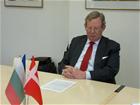 "... if it had been a eurozone country right now had been a president of the Council in the EU, you might have risked - I'm not saying that it would have happened, I say that it may have happened - that people living in the non-eurozone countries would have felt that it was the eurozone countries that ran the whole show and the EU could have had a PR problem towards 10 member states populations, if you understand what I'm trying to say", the Danish ambassador said.
"... if it had been a eurozone country right now had been a president of the Council in the EU, you might have risked - I'm not saying that it would have happened, I say that it may have happened - that people living in the non-eurozone countries would have felt that it was the eurozone countries that ran the whole show and the EU could have had a PR problem towards 10 member states populations, if you understand what I'm trying to say", the Danish ambassador said.
The eurozone concerns all of us,
was another important message the diplomat conveyed in his interview for euinside. Our economies are so interlinked, he underscored, that if the problems of the euro area become really big this would affect us all - it will affect you, it will affect us, Ambassador Janson explained.
And what is your problem with Schengen?
Of course it was inevitable that we discuss Schengen with Denmark's ambassador in Sofia. However, this was the topic on which we disagreed because he was unable to understand what is the problem when travelling to show our passports. After all, he said, it is not a problem for you to travel from Sofia to Copenhagen. What is required from you is just to show your passport. And in order to be more convincing he quoted the example of Ireland and Britain, who are not members of Schengen. I tried to explain that it is one thing to travel in the EU as an Irish or a British and slightly different to be a Bulgarian, especially when you travel by car.
We did not manage to reach a common opinion but His Excellency underlined that Denmark does not share the Netherlands's position and firmly believes that Bulgaria is technically ready. He quoted the Danish minister of justice who said during the informal Justice and Home Affairs Council in Denmark last week that he hoped precisely during the Danish semester a decision to be taken on Bulgaria's and Romania's accession.
Your biggest mistake is that you did not utilise EU funds
Without hesitating at all Kaare Janson answered firmly the question what is the 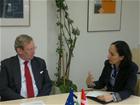 biggest mistake of the first five years of Bulgaria's membership in the EU. It is low absorption of EU funds - only 20%, in his words. This is why he welcomed the decision of the government to resort to the expert assistance of the World Bank, the European Investment Bank and the European Commission. An agreement for this was signed [in Bulgarian] on January 22 in Sofia. This is actually a memorandum for understanding, partnership and technical assistance with regard to the implementation of the structural tools of the EU with the World bank and the European Investment Bank. During the ceremony of signing PM Boyko Borissov hoped that in 2012 a 40% absorption rate will be achieved.
biggest mistake of the first five years of Bulgaria's membership in the EU. It is low absorption of EU funds - only 20%, in his words. This is why he welcomed the decision of the government to resort to the expert assistance of the World Bank, the European Investment Bank and the European Commission. An agreement for this was signed [in Bulgarian] on January 22 in Sofia. This is actually a memorandum for understanding, partnership and technical assistance with regard to the implementation of the structural tools of the EU with the World bank and the European Investment Bank. During the ceremony of signing PM Boyko Borissov hoped that in 2012 a 40% absorption rate will be achieved.
With Ambassador Janson we spoke about many other things, which you can see in the video - a conversation that ended with optimism but also with clear comprehension that at the moment we are at the bottom where we will stay a while.
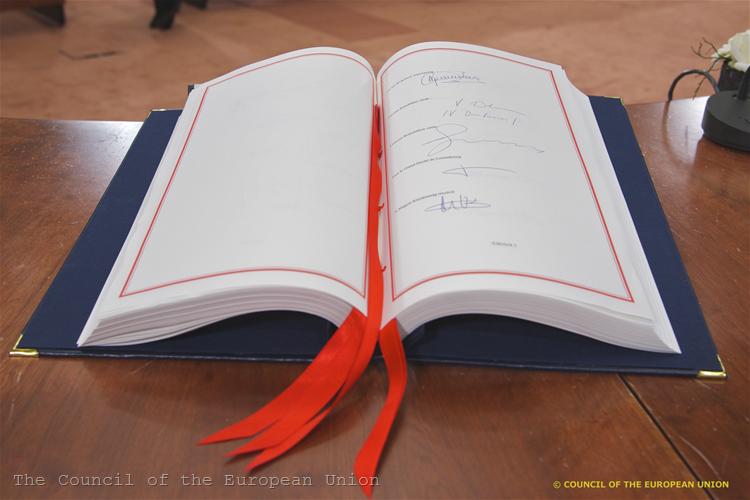 | © The Council of the European Union
| © The Council of the European Union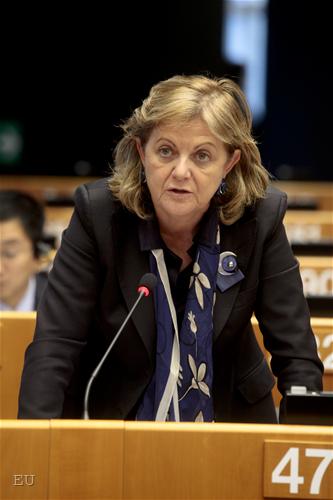 | © EU
| © EU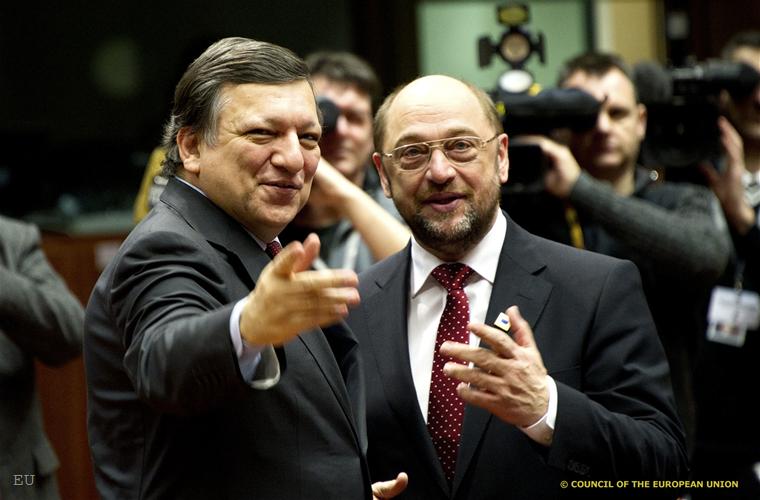 | © EU
| © EU